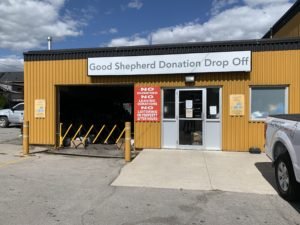An Interview with Clara Fiala of Warm Soles
By Valerie Chow, OPIRG McMaster
There are over 700,000 people who make up the homeless population in North America, and a research study by To et al. (2016) determined that up to two-thirds of these individuals have reported foot health concerns. Due to improper footwear, poor hygiene, lack of access to health services, and walking as the common mode of transportation, chronic foot problems such as skin breakdown, frostbite, infection, and trench foot are common These diseases, despite being common to homeless individuals, are often inadequately treated. It is because of these issues that Warm Soles was created. I was able to speak with Clara Fiala, the co-founder and co-president of Warm Soles, to ask a few questions about the organization.
What do you do as part of Warm Soles? Why and how did you become involved with this organization?
I’m the co-founder and co-president of Warm Soles along with Christina Hamilton. We have a small executive team, so I do a variety of different tasks; from big picture planning to liaise with partner organizations/ collaborators to general administration. I’ve always wanted to run my own project and I had also read an article about how people experiencing street homelessness disproportionally suffered from preventable foot ailments. When I saw OPIRG’s ad for PIP applications on Facebook, everything seemed to come together and I jumped at the chance. The project was quickly approved, and it’s been going strong ever since.
What exactly does Warm Soles do? What are does this organization hope to achieve? What is your mission?
Warm Soles was founded in January 2020 to collect socks for people experiencing street homelessness. Sadly, this population has an inordinately high incidence of foot diseases which can often be prevented or alleviated at least in part by good quality socks. When COVID-19 shut down in-person activities in mid-March 2020, we were no longer able to continue our on-site advocacy and fundraising programming. Fortunately, we had made a lot of progress in a short time and had enough resources to donate 225 pairs of socks to the Good Shepherd Hamilton. Over Summer 2020, we started to explore letter writing as a new way of connecting with clients at local shelters. We engaged McMaster students and local community members to write short, anonymous and positive letters to spread some light to the homeless/vulnerably housed population during this difficult time. The initiative was designed to be completed online; participants uploaded pdfs or photos of their letters and we printed them, attached a chocolate and delivered them to the shelter in batches. In total, we delivered ~90 letters to Mission Services Hamilton and Haven Toronto.
What are some of the programs you run and what do you hope to achieve with them? Are there any new events or programs that you want to implement/will start soon?
The sock drive and letter-writing campaigns are currently Warm Soles’ major priority as they take a significant amount of time and resources to organize. In the future, we hope to expand our program to more organisations and of course to write more letters. We found that partnerships but various student groups including the McMaster Chemical Engineering Graduate Society and the Society of Arts and Science Students have been helpful in spreading the word about what we do. However, we are always open to new partnerships and new ideas to further our work!
From your experiences, what do you think you have gained out of being a part of Warm Soles? (Skills, memories, connections, etc.)
Leading Warm Soles has been a highlight of my undergrad. It gave me firsthand experience building an organization from the ground up and a renewed appreciation of all the effort that goes into keeping a group running smoothly. It has also been a pleasure to work and connect with Mission Services Hamilton and Haven Toronto as well as our collaborators (Society of Arts and Science Students, Chemical Engineering Graduate Society, Isherwood Associates). Dealing with the challenges posed by COVID-19 has also been a great learning experience because it has developed resilience and creative problem-solving. Finally, it was highly rewarding to simply make a small difference during this difficult time. For example, one shelter mentioned that a client had even hung one of our letters in his tent!
Is there anything you wish other people knew more about your organization/mission/goals, etc.?
I wish students knew how easy it is to get involved in Warm Soles. We require a very small time commitment; it generally takes folks about half an hour to write one letter We know it can be daunting to write a letter to a stranger or someone from anunfamiliar demographic but we’ve received really positive feedback on how rewarding and fun it was. We aim to keep the process as rewarding and streamlined as possible.
What are the main obstacles that your organization experiences? How does the organization plan to overcome them?
Firstly, Warm Soles is a very small organization run by full-time undergrads so there are inherent time and resource limitations. Especially during COVID-19, it’s been hard to spread the word about our work. Normally, we would have advertised using posters on campus and high traffic locations e.g., libraries. We did manage to overcome this limitation to some degree by partnering with student organisations that reach a different population of students, however, this is definitely an area of improvement for us. In the future, we hope to grow our network by creating an Instagram because we know that is one of the best ways to reach younger students.
How has COVID-19 impacted your organization and your mission?
COVID-19 necessitated a significant pivot in our activities and presented some significant organizational and promotional challenges. However, it has been rewarding to innovate and explore new avenues. For example, we likely would not have introduced our letter-writing program. It has the added bonus of being a no-cost way for students to participate which is different from our sock drive that relies on donations. Many people have tight finances so it is helpful to empower people to give their time instead of their money. OPIRG also doesn’t have the capabilities to collect donations online like that of a big organisation making fundraising impractical in a virtual setting. We do receive a helpful budget from OPIRG which we used to give do a gift card draw for our letter writers and also to buy chocolate to attach to our letters as an added treat.
Now that lockdown regulations are slowing down and things are opening up again, what kind of changes do you expect to happen with Warm Soles?
Some of our key members are moving on or graduated this year so the exact future of Warm Soles is not 100% confirmed. However, we would definitely like to use this transition back to in-person learning to better promote our letter-writing campaignand resume fundraising for our sock drive. In winter 2020, we sold buttons (created using OPIRG’s handy button maker) and had a coin jar competition, and it would be great to resume these activities. There is still not complete clarity about what shape extra-curricular activities will take this year and the policies that Warm soles will follow as an OPIRG project, so stay tuned for exact details.
If I wanted to get to know Warm Soles better, what are the best ways to learn more?
The best place to learn about Warm Soles is our section of the OPIRG website. There, you can find information about our projects as well and recent information on volunteering. There are also some photos as well our end of year report can also be found on the general OPIRG website. We also maintain a Facebook page and we invite you to like it to stay up to date with our progress. The Silhouette also published an article about our work last summer which can be found here. Finally, you can always contact us directly by emailing warmsoles@opirgmcmaster.org and we would be more than happy to answer any questions you may have.
How can others get more involved? What kind of processes are done to join?
When we are actively running letter-writing campaigns (generally open for a month or two), we post specific information on our Facebook as well as our section of the website. There will be a form link for you to sign up to receive our information package and specific instructions on how to submit your letters. It’s designed to be straightforward and streamlined. Importantly, you don't have to be a McMaster undergraduate student to participate - anybody can write a letter and be entered in our gift card draws. We have received many submissions from outside partners! If you are interested in taking on more of an executive role within our project, please email us directly.
References
To, M. J., Brothers, T. D., &; Van Zoost, C. (2016). Foot Conditions among Homeless Persons: A Systematic Review. PloS one, 11(12), e0167463. https://doi.org/10.1371/journal.pone.0167463



